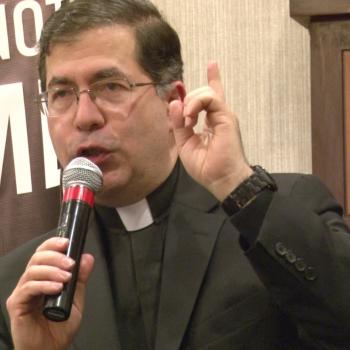By J. E. Dyer

In my new gig here at Patheos I will be writing a column entitled The Optimistic Christian. This is a companion title to my blog, The Optimistic Conservative, but it’s more than that. It’s an attitude of trust about the promises of God for our lives: a certainty that He asks only what is possible and rewards what He says He will. It’s a belief that we can live as if these things are true. We don’t need to accept defeat, failure, a smaller future than we hoped for, a downward spiral for those we love, a permanently impoverished style or scope of life. The natural world can’t dictate any of these things to us as inevitable. It can’t enforce them on us.
As I have outlined at my own politically-oriented blog, the concept of “optimistic conservatism” is grounded in realism. It does not suppose, in Pollyanna fashion, that everything will somehow turn out well, no matter how we carry on civil life and no matter what we let government do. There are wages of sin in every aspect of life. Living irresponsibly as a citizen carries consequences. Allowing government to purchase power over us with false promises is a bad practice that will lead, unchecked, to societal ruin. Dismissing these realities isn’t optimism, it’s foolishness.
But optimism based on the opposite proposition -- i.e., that of living responsibly and keeping government limited and on a short leash -- is well-founded. Humanity has, of course, far less experience with living in this way than with the model of centralized power in which the common people subsist in some degree of serfdom. Where we’ve had the opportunity to live in greater religious, political, and economic freedom, however, freedom has produced an astounding harvest of cooperation, societal goodwill, and plenty. At no time are we justified in assuming that this human dynamic has somehow been superseded by “new” conditions. We should always be optimistic about the consequences of respecting the people’s individual capacities, and tailoring government to a largely self-sufficient and self-ordering population.
In like manner, optimistic Christianity doesn’t ignore the dangers of sin or moral sloth. It acknowledges without caveat what those dangers are; it affirms, in fact, that optimism about God’s promises depends on doing so. If we are too proud to accept instruction and rebuke -- or to recognize that in our own strength, we can’t benefit from them and avoid sin -- then we deflect blessings and good results from our lives as surely as we do when we seek solutions in larger and larger government.
But the converse is profoundly and reliably true -- and that is the foundation of optimistic Christianity. If we will do things God’s way, blessings follow. There are no caveats or exceptions. I believe most people find the first and greatest blessing to be peace of mind and heart: a balance we can’t be knocked off of. This doesn’t mean we’re never alarmed or worried, but it means that we know what to do with those disruptive emotions. We can invoke Philippians 4:6-7 and find our equilibrium restored. We are guaranteed the fruits of the Spirit outlined in Galatians 5:22-23: love, joy, peace, patience, kindness, goodness, faithfulness, gentleness, and self-control. [All citations NIV]
And with this fruit comes benefit for our lives -- and not for ours alone, but for the communal life we live with those around us. Patience and gentleness make a difference not only in dealing with our children or the people at work, but in our wisdom about social issues, politics, and even national security. It is impossible to be long-headed or visionary without patience. It is likewise impossible to persuade others, and garner support for a vision, without gentleness. Goodness and self-control make all the difference in executing a public trust without abusing it. Kindness and faithfulness are indispensable qualities for successful small business proprietors, as they are for lending and borrowing, owning property and investing. Aspiring to lead others devolves inevitably into manipulation and cynicism, unless it is motivated by love. Without joy, leadership loses its savor and purpose.
All these qualities add up to character. They are what Paul had in mind in Romans 5:3-5, when he described this important progression:





